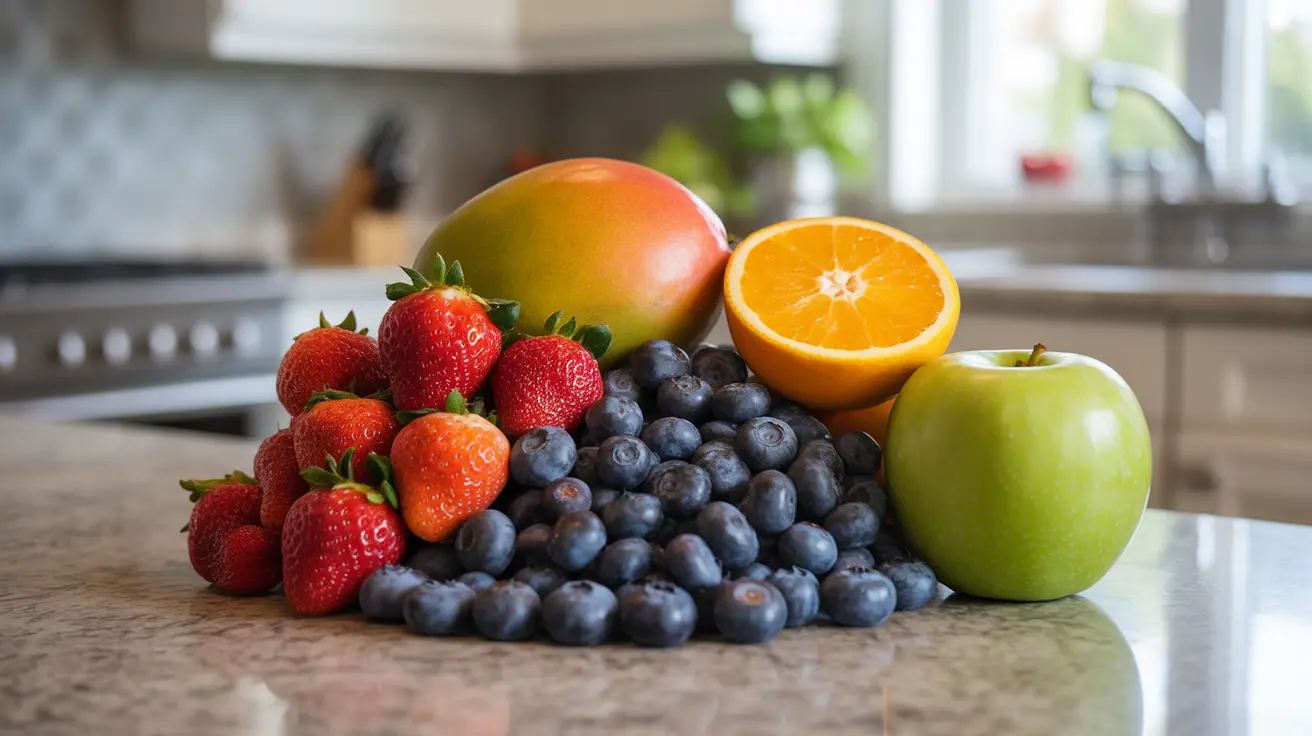Incorporating healthy fruits into your daily diet is one of the most effective ways to boost your overall health and well-being. These natural powerhouses are packed with essential nutrients, antioxidants, and fiber that can help prevent diseases, improve heart health, and enhance your body's natural functions.
Understanding the unique benefits of different fruits and how to best incorporate them into your diet can make a significant difference in your health journey. Let's explore the incredible world of healthy fruits and discover how they can transform your wellness routine.
The Rainbow of Health Benefits
Different colored fruits offer unique health benefits, thanks to their diverse nutrient profiles and bioactive compounds. Here's what makes each color group special:
Red Fruits
Red fruits like strawberries, pomegranates, and watermelon contain lycopene and anthocyanins, powerful antioxidants that may help reduce the risk of certain cancers and support heart health. These fruits are particularly effective at fighting free radicals and reducing inflammation in the body.
Blue and Purple Fruits
Blueberries, blackberries, and purple grapes are rich in flavonoids and resveratrol, compounds that support brain function and may help prevent cognitive decline. These fruits have shown promising results in improving memory and protecting against oxidative stress.
Yellow and Orange Fruits
Oranges, mangoes, and peaches are excellent sources of vitamin C, beta-carotene, and other carotenoids. These nutrients support immune function, promote healthy skin, and help maintain good eye health.
Heart-Healthy Fruit Options
Several fruits have been specifically linked to improved cardiovascular health. Regular consumption of these fruits can help maintain healthy blood pressure levels and support overall heart function:
- Berries (particularly blueberries and strawberries)
- Apples
- Citrus fruits
- Avocados
- Grapes
Whole Fruits vs. Fruit Juices
While fruit juices can be refreshing and provide some nutrients, whole fruits offer superior nutritional benefits. The fiber content in whole fruits helps:
- Slow down sugar absorption
- Promote feelings of fullness
- Support healthy digestion
- Maintain stable blood sugar levels
Additionally, whole fruits contain more beneficial compounds that might be lost during the juicing process.
Disease-Fighting Properties
Regular consumption of healthy fruits plays a crucial role in disease prevention. The combination of vitamins, minerals, and phytochemicals works synergistically to:
- Combat inflammation
- Support immune function
- Regulate blood sugar levels
- Protect against cellular damage
- Promote healthy aging
Top Nutrient-Dense Fruits
Some fruits stand out for their exceptional nutritional profiles:
Fiber Champions
- Raspberries
- Pears
- Apples
- Blackberries
Vitamin-Rich Options
- Kiwis (Vitamin C)
- Guava (Vitamin C)
- Mangoes (Vitamin A)
- Oranges (Vitamin C)
Antioxidant Powerhouses
- Pomegranates
- Acai berries
- Goji berries
- Wild blueberries
Frequently Asked Questions
What are the health benefits of eating different types of fruits every day? Daily consumption of various fruits provides a wide range of nutrients, antioxidants, and fiber that support immune function, digestive health, and overall wellness. Each type of fruit offers unique benefits, making variety essential for optimal health.
Which fruits are best for improving heart health and lowering blood pressure? Berries, particularly blueberries and strawberries, along with citrus fruits, apples, and pomegranates, are excellent for heart health. These fruits contain compounds that help reduce blood pressure, improve circulation, and protect against heart disease.
How does eating whole fruits compare to drinking fruit juices in terms of nutrition? Whole fruits are nutritionally superior to fruit juices because they contain natural fiber, which helps regulate blood sugar levels and promotes satiety. Whole fruits also retain more nutrients and beneficial compounds that might be lost during juicing.
Can eating a variety of colorful fruits help prevent chronic diseases like diabetes and cancer? Yes, consuming a variety of colorful fruits can help prevent chronic diseases. Different colored fruits contain various antioxidants and phytochemicals that work together to fight inflammation, regulate blood sugar, and protect against cellular damage that can lead to cancer.
What are the healthiest fruits rich in fiber, vitamins, and antioxidants? The healthiest fruits include berries (especially blueberries, raspberries, and blackberries), pomegranates, kiwis, oranges, and apples. These fruits are particularly rich in fiber, essential vitamins, and powerful antioxidants that support overall health.




